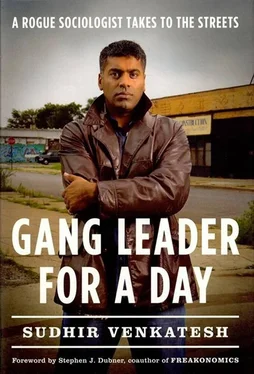We waited for Reggie inside the club, where a children’s Christmas party was in progress. The mood was happy, especially since some local stores had donated crates of food for tenant families.
Reggie arrived wearing a Santa hat. He’d been at another Christmas party, passing out toys donated by police officers. When he saw my car, he dropped his head and then peered at Autry.
“Did you talk with him?” he asked Autry.
“I did, but he’s pigheaded. He don’t listen.”
I was confused.
“Sudhir, is there any way you could let me know when you’re going to come around here?” Reggie asked. “I mean, maybe you could page me and leave a message.”
“What are you talking about? I come over here nearly every day! Can you guys please tell me what’s going on?”
“Let’s go for a walk,” Reggie said, grabbing my arm.
It was freezing, and the wind was howling. We walked around the project buildings. The fresh snow made the high-rises look like gravestones sticking up from the ground.
“Sudhir, you’re getting into something you shouldn’t be messing with,” Reggie said. “You’ve been reading about the gang busts, right?”
Yes, I told him. The newspapers had been reporting the recent arrests of some of the highest-level drug dealers in Chicago. These arrests were apparently intended to interrupt the trade between the Mexican-American gangs who imported cocaine and the black gangsters who sold crack.
Word on the street was that the FBI and other federal agencies were behind the arrests. Although I hadn’t been in touch with J.T. lately-he was still busy settling into his expanded Black Kings duties-he had told me in the past that federal involvement frightened the gangs. “Once you see the feds, that’s when you worry,” he said. “If it’s local, we never worry. As long as you don’t do something stupid, you’ll be okay.” Although the recent arrests involved gang leaders more senior than J.T., and not even in his neighborhood, he was habitually concerned that federal officials would work their way down the ladder to him. He also reasoned that the feds would specifically target the Black Kings if possible, considering that the gang ran what was probably the city’s smoothest drug operation.
Reggie now told me that the feds were indeed working Chicago-and hard. They were hoping to indict the drug gangs under the powerful Racketeer Influenced and Corrupt Organizations (RICO) Act, which was instituted in 1970 to combat the Mafia and other crime groups that dealt in money laundering, gambling, and union shakedowns. RICO had been so successful in disrupting Italian, Irish, and Jewish crime gangs that the feds were now using it to go after street gangs, claiming that they, too, were organized criminal enterprises.
Reggie explained that he, like most street cops, hated it when federal agents came to town. They were so eager for high-profile indictments, he said, that they’d use allegations of police improprieties to leverage local cops into turning over their gang intelligence. This in turn would disrupt the relationships that cops like Reggie had carefully built up in the community.
“What does all this mean for you?” I asked. “And for me?”
“For me it means I got to do everything by the book. For you it means you have to be very, very careful. I heard from Ms. Bailey that you’re asking a lot of people about us. Now, that doesn’t bother me, like I said before. But there are a lot of folks where I work who think you’re trying to bust them, do you understand?”
“Bust them?”
“They think you’re looking for dirt. Looking to find something to hold against them. I wouldn’t worry about your car. Just trust me, it won’t happen again.”
After this talk with Reggie, I began to fear the police much more than I had ever feared J.T. and the gangs. As Autry had told me, it was the cops who had the real power. They controlled where and how openly the gang could operate, and, if so inclined, they could put just about anyone in jail. Still, as both Autry and J.T. had told me, the cops rarely arrested gang leaders, since they preferred to know who was in control rather than having to deal with an unpredictable leader or, even worse, a power vacuum. When I asked Reggie if this was really true, his response-he dropped his head and asked me not to press him on the issue-seemed to indicate that it was.
Not every cop in the projects was corrupt or abusive, but I had become nervous about getting on the cops’ bad side. I had no desire to get beaten up or be regularly harassed. I’d grown up thinking of cops as people you trusted to help when things went bad, but that wasn’t the way things worked here, even for me. Not that I’d endeared myself to the cops: I came into the projects by befriending a gang leader, after all, and I hung out with a lot of tenants who did illegal things for a living.
Looking back, I think it would have been better to learn more about the neighborhood from the cops’ perspective. But this wouldn’t have been easy. Most tenants probably would have stopped speaking with me if they thought I was even remotely tied to the police. One reason journalists often publish thin stories about the projects is that they typically rely on the police for information, and this reliance makes the tenants turn their backs.
As it was, the best I could do was try to learn a little bit from cops like Reggie. He could be just as creative in his approach to police work as some of the tenants were in their approach to survival. If this meant sharing information with gang members to ensure that their wars didn’t kill innocents, so be it. Rather than arresting young gang members, Reggie and other cops used “scared straight” tactics to try to get them to stop dealing. I also watched many times as the police mediated disputes between hustlers; and even though they weren’t always responsive to domestic-abuse calls, many cops did help Ms. Bailey scare perpetrators so they wouldn’t come into the high-rise again.
It wasn’t until months after my car was broken into that Reggie confirmed it had been the police who did it. Officer Jerry and a few of his friends were apparently concerned about the contents of my notebooks and wanted to find them. Bad Buck, a young man from Robert Taylor whom I’d befriended, had told the police that I kept my notes in my car. Reggie said that Buck had been caught holding a thousand dollars’ worth of cocaine and had surrendered the information about my notes in exchange for not going to jail.
In early 1995 the newspapers began to report another story of major import for the residents of Robert Taylor, this one with even greater consequences than the federal drug busts. Members of Congress and the Clinton administration had begun serious discussions with mayors across the country to propose knocking down housing projects. Henry Cisneros, the secretary of housing and urban development, claimed that “high-rises just don’t work.” He and his staff spoke of demolishing these “islands of poverty,” with the goal of pushing their inhabitants to live where “residents of different incomes interact with one another.” Cisneros singled out Chicago’s projects as “without question, the worst public housing in America today.” The Robert Taylor Homes were said to be at the very top of the demolition list. They were to be replaced by an upscale town-house development called Legends South, which would include just a few hundred units of public housing.
Most of the tenants I spoke with greeted this news with disbelief. Did the politicians really have the will or the power to relocate tens of thousands of poor black people? “The projects will be here forever,” was the phrase I heard from one tenant after another. Only the most elderly tenants seemed to believe that demolition could be a reality. They had already seen the government use urban renewal- or, in their words, “Negro removal”-to move hundreds of thousandsof black Chicagoans, replacing their homes and businesses with highways, sports stadiums, universities-and, of course, huge tracts of public housing.
Читать дальше












